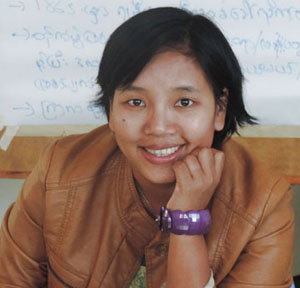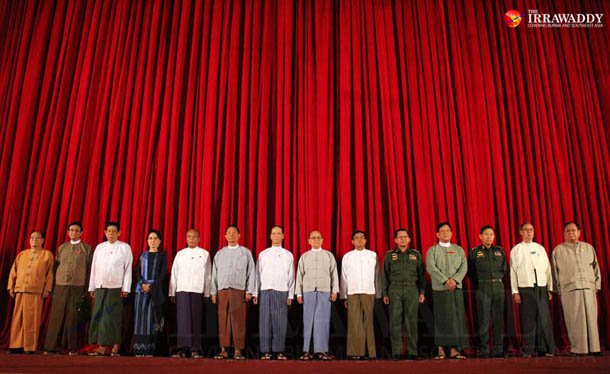Talking is better than fighting and shaking hands is better than using a fist; these are universal truths. It is clear that Burma’s present triumvirate of political leaders—President Thein Sein, Union Parliament Speaker Shwe Mann and the Burma Army commander in chief Snr-Gen Min Aung Hlaing—have finally realized that a dialogue with their opponents is inevitable. Burma’s ethnic armed groups and democracy leader Aung San Suu Kyi will get a chance to have their say.
Over the last three years, it seems to me the three men are using a “keep your enemies close” strategy, and they have used it wisely and carefully.
In 2011, Thein Sein initiated ceasefire talks with Burma’s ethnic armed groups, whose main political demands are a federal state, self-determination and an equal seat at the table on decisions affecting their economic and social existences. At the time, we welcomed the invitation.
Since the beginning of the talks, 14 ethnic armed groups have signed bilateral ceasefire agreements, although implementation of those accords has been weak. The ethnic groups have since joined up to coordinate among themselves, and have insisted that ceasefire agreements alone are not enough to obtain a lasting peace. The search for such a peace has led them to advocate for a “political dialogue,” the goal of which is to amend Burma’s Constitution based on the outcome of the talks.

Surprisingly, the president and his team, including chief peace negotiator Aung Min, are also convinced that political dialogue is the way to move forward. This is to the president’s credit, and trust in him has grown among the ethnic armed groups and other political players. I hear people say, “The president is sincere about the peace process.”
They might be right. But the president does not hold the key to ending ethnic conflict in Burma, someone else does—or perhaps no one does at all. What’s clear is that Thein Sein is not the man who ultimately calls the shots, as has been proven by the recent attack on a Kachin military academy in Laiza, Kachin State. Indeed, the Kachin Independence Army has faced several of the heaviest military attacks in decades under Thein Sein’s government. Meanwhile small skirmishes in Shan and Karen states have also occurred, raising questions about the relationship between the executive branch and Burma’s powerful military establishment.
Another aspect of the country’s reform process pertains to the “democratization” of lawmaking. The establishment of a nascent parliamentary system has been guided by Shwe Mann, with whom it is believed Suu Kyi has struck up something of a bond. But friendship or not, more than three years of parliamentary proceedings has not resulted in much-anticipated constitutional amendments. Despite the efforts of Suu Kyi and her party to amend the Constitution from within the parliamentary system—and in defiance of public support for change, as indicated by a massive NLD-led signature campaign—prospects for charter reform look dim. Again, it raises the question: Is this friendship a “keep your enemies close” strategy? Many of us would not be surprised as we all know these former generals are masters of tricks and strategizing.
By late 2013, Min Aung Hlaing had made his presence known in both Burma’s peace process and parliamentary affairs. It quickly became clear that his military, also known as the Tatmadaw, is by no means under the control of the president or Parliament. In fact it is the other way around, as we’ve seen through the Tatmadaw’s stonewalling of parliamentary debate on constitutional reform and a flexing of its military might in ethnic border regions. The latter has prompted major doubts about the peace process, and negotiations have essentially been deadlocked since the last time the two sides met in September.
Many observers now wonder, “What does the army chief want?”
Recently, he allowed himself to be seen palling about with leaders of the military’s long-time nemesis, the Karen National Union (KNU). The images call to mind a time back in 1992, when the regime gave favor to the Kachin Independence Organization (KIO), while simultaneously fighting against the rest of the ethnic armed groups. Is the same tactic being applied today?
This is a perfect game, with all the high drama an audience could ask for. And what comes next? The outcome is unclear, but the roster is set: ethnic armed groups; Aung San Suu Kyi and her National League for Democracy (NLD) party; various other political parties; civil society; and the international agencies, all will be kept busy with the tricks and distractions of the men pulling the strings. Meanwhile, legislation will be passed by Parliament, policies and laws will be adopted and implemented by the executive, and fighting will continue, ignited by the Tatmadaw.
Nevertheless, the ethnic armed groups and the government negotiating team will continue to profess their faith in the overall process, without setting a timeframe for political dialogue. Calls will continue to be made for a “sexpartite dialogue,” which many believe would serve as nothing more than a symbolic gathering of the leaders—if it happens at all.
And all the while, the ball is being passed among three powerful men.
Cheery Zahau is a human rights activist from Chin State.

















